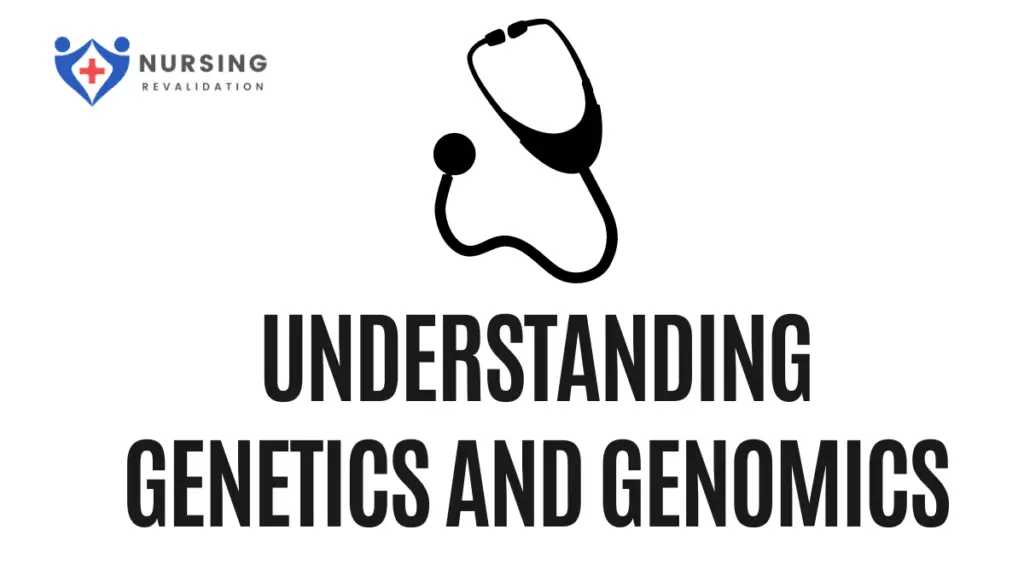In the ever-evolving landscape of healthcare, genetics and genomics play an increasingly vital role. Nurses, as frontline healthcare providers, are integral in understanding and applying these concepts in their practice. This comprehensive guide aims to elucidate the fundamentals of genetics and genomics for nurses, empowering them to deliver more informed and personalized patient care.
The Fundamentals of Genetics
What is Genetics?
Genetics is the study of genes, DNA, and heredity in living organisms. Genes are the basic units of heredity, containing instructions for the development, functioning, and reproduction of organisms. Understanding genetics allows healthcare professionals to comprehend how traits are passed down from one generation to the next.
DNA Structure and Function
Deoxyribonucleic acid (DNA) is a molecule that carries the genetic instructions for the development, functioning, growth, and reproduction of all known living organisms. DNA is composed of nucleotides, each containing a sugar molecule (deoxyribose), a phosphate group, and one of four nitrogenous bases: adenine (A), thymine (T), cytosine (C), and guanine (G). The sequence of these bases forms the genetic code, which determines an individual’s traits and characteristics.
Table 1: Common Genetic Disorders
| Disorder | Description | Genetic Basis |
|---|---|---|
| Cystic Fibrosis | Inherited disorder affecting the lungs and digestive system | Autosomal recessive |
| Huntington’s Disease | Neurodegenerative disorder leading to motor and cognitive decline | Autosomal dominant |
| Down Syndrome | Chromosomal disorder resulting in intellectual disability and physical abnormalities | Trisomy 21 |
Introduction to Genomics
What is Genomics?
Genomics is the study of an organism’s entire genome, including all of its genes and their interactions. Unlike genetics, which focuses on individual genes and their functions, genomics examines the entirety of an organism’s genetic makeup. This holistic approach allows healthcare professionals to understand how genes work together to influence an individual’s health and susceptibility to diseases.
Applications of Genomics in Healthcare
Genomics has revolutionized healthcare by enabling personalized medicine, predictive genetic testing, and targeted therapies. Nurses can leverage genomic information to assess patients’ risk factors for genetic disorders, tailor treatments based on their genetic profiles, and provide personalized counseling and support to patients and their families.
Genetic and Genomic Nursing Practice
The Role of Nurses in Genetic Counseling
Genetic counseling is a collaborative process between healthcare professionals and patients to address the genetic aspects of health and disease. Nurses play a crucial role in providing genetic counseling services, which may include assessing patients’ family histories, facilitating genetic testing, interpreting test results, and offering emotional support and guidance to patients and their families.
Ethical and Legal Considerations in Genetic Nursing Practice
As with any aspect of healthcare, genetic and genomic nursing practice is governed by ethical principles and legal regulations. Nurses must adhere to professional standards of practice, maintain patient confidentiality, obtain informed consent for genetic testing, and navigate complex ethical dilemmas related to genetic information and privacy.
Integrating Genetics and Genomics into Nursing Education and Practice
Nursing Education and Training in Genetics and Genomics
To effectively incorporate genetics and genomics into nursing practice, educational institutions must integrate these concepts into nursing curricula and provide ongoing training and professional development opportunities for nurses. By equipping nurses with the knowledge and skills necessary to understand and apply genetics and genomics in their practice, healthcare organizations can improve patient outcomes and enhance the quality of care delivery.
Resources for Nurses in Genetics and Genomics
Numerous resources are available to support nurses in their understanding and application of genetics and genomics in clinical practice. Professional organizations, academic institutions, online courses, and peer-reviewed journals offer a wealth of information and educational materials on genetics, genomics, and related topics. Additionally, interdisciplinary collaboration with genetic counselors, geneticists, and other healthcare professionals can further enhance nurses’ proficiency in genetics and genomics.
Conclusion
In conclusion, genetics and genomics are integral components of modern healthcare, with profound implications for nursing practice. By understanding the fundamentals of genetics, embracing the principles of genomics, and integrating genetic and genomic knowledge into nursing education and practice, nurses can play a pivotal role in delivering personalized, patient-centered care. As healthcare continues to advance, nurses must remain abreast of developments in genetics and genomics to meet the evolving needs of their patients and communities.

